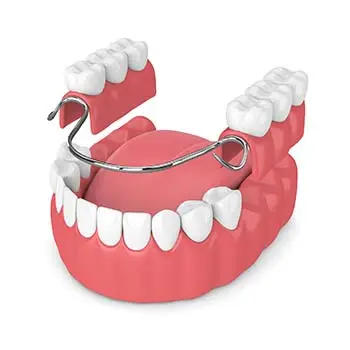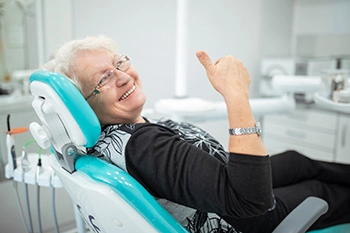
There are several tooth replacement options available. All of them have the same goal:
- Restore oral health
- Restore functionality
- Restore appearance
The ideal way to replace missing teeth is with dental implants. Unfortunately, dental implants cost around $5,000 each and dental insurance may not cover any portion of the treatment cost. This can be costly, especially if you need multiple teeth replaced.
Removable dentures are a more affordable option. If you need to replace an entire arch of missing teeth, full dentures are the best option. On the other hand, if you still have some remaining natural teeth, a removable partial may be the best option.
In this article, we’ll explain everything you need to know about removable partial dentures.
Removable Partial Dentures Defined
Removable partial dentures are the ideal option when there are still healthy teeth remaining in the jaw. This dental prosthetic consists of a pink, gum-colored acrylic base with artificial teeth attached. The teeth may be made of porcelain or composite resin. In most cases, it includes a metal framework that secures the denture to the natural teeth.
3 Types of Removable Partial Dentures
If you and your dentist have determined that a partial denture is your best option, you’ll need to know what options are available. There are three basic types of partial removable dentures:
-
Cast Metal Removable Partial Dentures
Cast metal is the most common type of partial denture. This type of denture features a metal base made of cobalt-chromium alloy that is attached to your natural teeth with metal clasps or precision attachments.
The primary difference between clasps and attachments is appearance. If you are concerned with your appearance, precision attachments may be the better option. These offer a more natural aesthetic but typically cost more than a partial with metal clasps.
This type of partial is a good permanent solution that can last for many years.
-
Acrylic Clasp Removable Partial
Acrylic clasp removable partials are also referred to as dental flippers. This type of partial features a pink base that rests on the gums. Most dentists recommend these for temporary use while you wait for a permanent denture because the material is weak and may break.
This is the least expensive type of removable partial. However, due to the thick acrylic base, they are not as comfortable as other options.
-
Flexible Partial Dentures
Some patients may be sensitive or allergic to cast metal or acrylic. In this case, flexible partial dentures are an option. These dentures are made from thin plastic, offer a natural appearance, and are the most comfortable.
However, they are the most expensive type of partial denture and they do not last as long as cast metal. Still, they are sufficient for restoring your missing teeth.
Advantages of Removable Partial Dentures
There are several advantages of removable partial dentures, including:
- Restored function
- Boosted confidence
- Improved appearance
- Less expensive than other tooth replacement options
- Can be adjusted as need, including adding new teeth
- More comfortable than full dentures
Removable vs. Fixed Dentures
The primary purpose of removable and fixed dentures is exactly the same: to restore appearance and functionality. However, there are a few differences:
Removable Dentures |
Fixed Dentures |
| Designed to replace missing teeth | Designed to replace missing teeth |
| Must be removed for cleaning | Can only be removed by the dentist |
| Restore appearance and functionality | Restore appearance and functionality |
| Slip and slide around on the gums | Secured in place with dental implants |
| Jawbone will deteriorate and additional teeth can be lost | Dental implants stimulate the jawbone to prevent deterioration, which may prevent additional tooth loss |
| Will need to be adjusted/relined due to changes in jawbone shape | Will not need to be adjusted/relined because implants protect against jawbone deterioration |
| Dental insurance often covers a portion of the cost | Dental insurance may not cover the implant procedure, but may cover a portion of the cost of the overdenture |
Removable Dentures
Designed to replace missing teeth
Must be removed for cleaning
Restore appearance and functionality
Slip and slide around on the gums
Jawbone will deteriorate and additional teeth can be lost
Will need to be adjusted/relined due to changes in jawbone shape
Dental insurance often covers a portion of the cost
Fixed Dentures
Designed to replace missing teeth
Can only be removed by the dentist
Restore appearance and functionality
Secured in place with dental implants
Dental implants stimulate the jawbone to prevent deterioration, which may prevent additional tooth loss
Will not need to be adjusted/relined because implants protect against jawbone deterioration
Dental insurance may not cover the implant procedure, but may cover a portion of the cost of the overdenture
Should I Consider Removable Partial Dentures?
There are several reasons you should consider scheduling a consultation to determine if removable partials are right for you:
- You are missing several teeth, but still have some healthy natural teeth remaining
- You don’t like to smile due to missing teeth and you’ve lost some of your confidence
- You have severe periodontal disease and/or tooth loss
A prosthodontist can examine your mouth and discuss your goals for treatment to determine if partials are a good option for you.
Denture Fitting Process: What to Expect
Typically, the process of getting dentures requires several appointments over several weeks. The first step is your initial consultation. During this visit, the dentist- typically a prosthodontist- will perform a comprehensive exam including x-rays, as well as discuss your needs/goals for treatment, to determine if you are a candidate for dentures.
If you are, the treatment process will begin:
One or more impressions will be made of your jaw, which will be used in the fabrication of your denture. The impressions will be sent to the dental lab and your denture will be made. When the dental lab completes fabrication, the denture will be sent back to your dentist and a fitting appointment will be scheduled. If necessary, adjustments will be made, and you will go home with a full set of teeth.
What Happens After the Denture is Placed?
When your removable partial denture is placed, your ability to eat, speak, and smile is restored. However, you may have some minor discomfort at first, especially if you’ve been without teeth for some time. The discomfort may continue, and the denture may feel loose until you get used to it. Some patients experience irritation, but this should subside as your mouth adjusts to the denture.
You may need to have several follow-up visits to ensure that the denture is settling as it should. If you are having problems, the dentist can make adjustments. Over time, you’ll need to have your denture adjusted or relined due to jawbone deterioration. This will prevent things like functional issues, mouth sores, or infections.
Caring for Removable Partial Dentures

In addition, you should visit the dentist at least once every 6 months for an exam and cleaning. This will help monitor your oral health and stop any issues before they worsen.
Finally, it’s important to note that removable partials are not as durable or strong as your natural teeth or fixed dentures, so you may need to be careful with certain foods.
Tips for Getting Used to Your Removable Partials
For the first few days, you’ll want to stick to a soft food diet. As you get used to having them, you can slowly transition to your normal diet. You’ll want to avoid chewing on hard items, including ice and hard candies. You should also avoid chewing gum, as it could get stuck on the clips.
Schedule Your Consultation at Sunflower Dental Spa
Missing teeth can lead to a variety of oral and overall health issues. The best way to mitigate these issues is with tooth replacement. If you still have some healthy natural teeth remaining, removable partials may be a good option.
If you’re in or near Rockledge, Florida, schedule your consultation with the team at Sunflower Dental Spa. We understand that the idea of dental treatment can make some patients uneasy. Therefore, we offer a spa-like environment to help our patients feel relaxed. In addition, we work closely with our patients to ensure that they understand their procedures.








